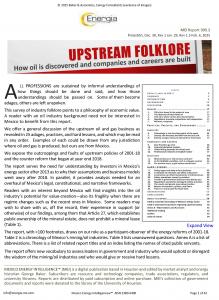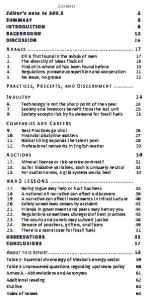
Houston’s Baker Energy Consultancy Reveals Oil Industry Wisdom in Its Folklore
25 oil industry adages, guidelines, and hard lessons with examples from Mexico
HOUSTON, TX, UNITED STATES, February 7, 2025 /EINPresswire.com/ -- In the third edition of a report entitled “Upstream Folklore: How Oil Is Discovered, and Oil Companies and Careers Are Built,” success and failure are seen as reflected in industry adages, guidelines, and hard lessons. Examples of each are drawn from the experiences of oil and gas companies, policymakers, and regulators in Mexico and the United States.
“These 25 adages, guidelines, and hard lessons point to a philosophy of economic value that underpins the upstream oil industry. Taken together, these adages and hard lessons constitute an Archimedean ruler with which to measure the market successes and failures of any oil jurisdiction—from Nigeria to Vietnam,” insists George Baker, the principal author of the report.
This analytical approach provides an indirect measurement of Mexico's success, over 25 years, to create sustainable frameworks for the oil and wholesale electricity markets, ones that would attract foreign investors. From 1992 to 2018, successive reforms limited investors to serving as contractors to the state-owned oil and power companies. In 2014, legislation in the oil market allowed for private investors to bid on acreage and be compensated proportionately to their success. In 2016, Pemex signed its first joint venture, a 40/60 deal with Australia’s BHP Billiton (succeeded in 2022 by Woodside Energy).
“This direction of public policy was reversed with the election in 2018 of Andres Manuel López Obrador as president,” observes Baker, whose newsletter, Mexico Energy Intelligence, has reported on the unfolding of policies and the responses of investors and governments since 1995.
The report describes how Houston’s Talos Energy and London’s Harbour Energy, both investors in the first oil auction of 2015, have been given hard lessons by Pemex, the legacy state oil company, regulators, and trade associations. "The appointment of Paul Goodfellow as CEO may be the company's last chance to extract value from its discovery, in 2017, of the near-giant reservoir named Zama," opines Baker.
As for adages about the discovery of oil and gas, two are well-known: “Oil is First Found in the Minds of Men” and “The Diversity of Ideas Finds Oil.” The report finds a partial explanation for the 50% drop in Pemex oil product since 2004 in an inadequate diversity of ideas, noting that most company earth scientists are graduates of just two universities; further, the lack of bilingual proficiency limits their participation in international meetings such as the annual Offshore Technology Conference (OTC) in Houston and the associated opportunity to build a global, professional network. The report asks: In whose minds was the Zama reservoir first discovered? In whose minds was a share of its equity first coveted?
Regarding oil policy, the report flags the Mexican government’s successive innovations in the design of petroleum agreements that license exploration and extraction but withhold commercial rights such as the reporting of production data and the booking of reserves. “Practicing attorneys and legal scholars have not publicly recognized that national ownership of the mineral estate in Mexico allows for a full-cycle mineral lease,” says Baker.
The report notes that on January 29, President Claudia Sheinbaum announced that the midstream and upstream regulators, which had been created in 1995 and 2008, respectively, would disappear. “The government is pivoting to a model of central planning and is turning its back on a generation of laws, policies and institution-building that had been intended to upgrade the energy sector to meet global expectations,” observes Baker, who adds “the success of the new orientation will be measurable by reference to production numbers and capacity rates. An understanding how things worked out will be discernible by reference to the adages, guidelines, and hard lessons that are identified in this report.
Appended to the report are two tables, and an index of the names of public officials, among others, cited in the report. Table 1 is a chronology of public policy in the mining and oil sectors. Table 2 is a partial list of unanswered questions concerning public administration in the oil and gas section since 2000. There is also appended an annotated title list of pertinent prior reports.
George Baker
Mexico Energy Intelligence
+1 832-434-3928
email us here
Visit us on social media:
Facebook
X
LinkedIn
Other
Distribution channels: Banking, Finance & Investment Industry, Business & Economy, Energy Industry, Mining Industry, Real Estate & Property Management ...
Legal Disclaimer:
EIN Presswire provides this news content "as is" without warranty of any kind. We do not accept any responsibility or liability for the accuracy, content, images, videos, licenses, completeness, legality, or reliability of the information contained in this article. If you have any complaints or copyright issues related to this article, kindly contact the author above.
Submit your press release


